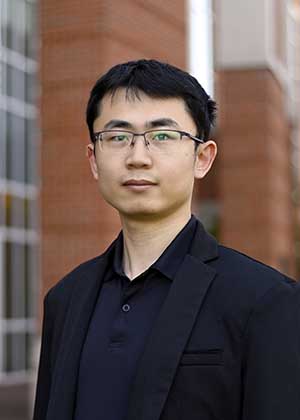NSF grants awarded CCI researchers to explore ways AI can aid aging population, patient diagnoses

Srijan Das and Xiang Zhang, two first-year faculty researchers in the College of Computing and Informatics, have received funding from the National Science Foundation to investigate how artificial intelligence can benefit older adults and others in health care settings.
Globally, the population aged 65 and older is growing. By 2050, the UN projects one in six people will exceed the age of 65. In North America and Europe, the number could be one in four.
Das: Researching human actions via digital observation
 Srijan Das, an assistant professor of computer science, received funding from the NSF’s Information and Intelligent Systems Division for the project, “Understanding Activities of Daily Living in Indoor Scenarios.”
Srijan Das, an assistant professor of computer science, received funding from the NSF’s Information and Intelligent Systems Division for the project, “Understanding Activities of Daily Living in Indoor Scenarios.”
The main goal of his research is to develop new AI algorithms to better understand human actions through video observation. This work has implications in a variety of settings. With regard to health care, Das noted monitoring individuals’ normal activities 24/7 can provide insight about their physical and mental state.
“Collecting data on people’s normal everyday activities, such as the speed of walking, how often they get out of bed during the night or experience difficulty in completing household chores and the repetition of certain actions, can provide a baseline of behavior that could assist health care providers in diagnosing changes as a result of dementia or Alzheimer’s.”
Das, who began his Charlotte tenure this past fall, noted AI algorithms that better interpret and anticipate the needs of older adults could be used to provide robotic assistance: reminding patients to take medications or assisting with daily tasks, such as retrieving utensils to prepare meals, picking up objects and aiding movement.
A graduate of St. Thomas’ College of Engineering and Technology in Kolkata, India, Das completed a master’s degree in computer science and engineering from National Institute of Technology, Rourkela India, and a Ph.D. in computer science from France’s Université Côte d’Azur.
Zhang: Monitoring brain activity for mental decline
 Xiang Zhang, also an assistant professor of computer science, received funding through the NSF’s Division of Information and Intelligent Systems for “Self-Supervised Contrastive Representation Learning for Medical Time Series.”
Xiang Zhang, also an assistant professor of computer science, received funding through the NSF’s Division of Information and Intelligent Systems for “Self-Supervised Contrastive Representation Learning for Medical Time Series.”
Zhang completed a postdoctoral fellowship at Harvard University before joining Charlotte this past fall. For more than seven years, he has studied how brain signals operate. Through his grant, Zhang seeks to identify dissonant cognitive patterns in the brain in an effort to create an AI algorithm to aid doctors to better understand patient health.
“This type of monitoring has implications, particularly for persons living with Alzheimer’s,” said Zhang, who completed a Ph.D. in computer science from the University of New South Wales. “Through ongoing cognitive assessment, it is possible to identify decreases in brain function over time. The algorithm would provide a baseline of brain activity that could be used to predict decline.”
Zhang noted electronic headsets enable researchers to test the brain’s electrical activity using an EEG or electroencephalogram. Typically, this requires thousands of hours of medical data by human experts. Zhang’s goal is to use the power of AI deep learning to develop an algorithm that requires significantly fewer annotations. Such algorithms could reduce the workload of health care providers and support their decision-making more quickly and efficiently.
Another aspect of Zhang’s research could affect ICU patients whose health monitoring sensors generate considerable data over time.
“If I am able to develop the correct algorithm, it could analyze all the data generated to interpret them in a manner consistent with a physician,” said Zhang.